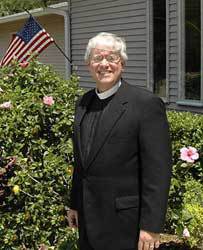Editor’s note: This is the 12th of many scheduled Lectionary Living columns to be written by clergy in the Diocese of Central Florida.
“A Total Eclipse of the Heart!”
(on Mark 7:1-8, 14-15, 21-23)
 Two brothers sat down for a lunch. They had not been together like this for many years; travel, families, careers, all seemed to give more importance and taken more time away from each other than was imaged.
Two brothers sat down for a lunch. They had not been together like this for many years; travel, families, careers, all seemed to give more importance and taken more time away from each other than was imaged.
They had been part of a large, Jewish family, and the stories of their youth became the pattern of their meal as they reflected on holy day meals, Hebrew school memories, Sabbath rituals, and all that made their life so poignant so many years before. The one brother remained strong in his orthodoxy; his older brother did not. As lunch was ending the older brother went to place the milk and butter into the refrigerator, the one that was used to hold the meat. The younger brother literally cried out, “What are you doing? Don’t mix the meat and the dairy!” (The biblical prohibition against mixing meat and dairy can be found in the dietary laws in the Torah.)
The older brother, rather embarrassed and a bit surprised over the outburst, yelled back, “What difference did it make? Food is food!” Both brothers were a bit taken aback by the ferocity of the conversation in that it brought back some of the hurts that sibling rivalry can sometimes bring forth.
Our gospel periscope from Mark shows Jesus as a well-known and skilled debater on the law and rabbinic tradition as He is confronted by the Pharisees and scribes concerning the ritual laws concerning food, but then on a deeper level, on how the believer lives one’s life out faithfully. The Pharisees and scribes explained and cherished the oral traditions of the elders as a supplement to the Law of Moses, and in this case, as they related to the purity codes concerning the processing and eating of food.
As protectors of the law and the purity codes, the Pharisees saw these codes as binding and authoritative as the written Torah; this oral law was so complicated that it left the believer bewildered or ignorant of all the intricacies. So cumbersome had the collection of oral interpretations become that ordinary lay people were in need to consult the scribes who had become specialists in the labyrinth of legal minutiae. Referred to colloquially as “fences around the law,” intended to protect and extend the law, the oral tradition had become more like a wall that separated and alienated people from God and true religion. Jesus, Himself, criticized this misplaced attention to the oral tradition, or Halakah, received and called it a “burden” (Matthew 23:4).
Any more than with the argument of the two brothers, over meat and dairy, the validity of the oral tradition, also known as the Halakah, is the heart of the controversy in this passage from Mark’s account. Jesus’ response to His critics and to those who found fault with His followers was based in part on the prophet Isaiah’s oracle against the hypocrisy of His people, quoted here “in Vain do they worship me, teaching human precepts as doctrines.” The power in Jesus’ message is that human traditions, no matter how ancient and precious, cannot set aside or replace the sacred precepts of God-given law. It is significant that Jesus did not negate the value of human tradition altogether but requited that the system of priorities be rethought and reordered – so as to subordinate all else to the eternal reality of God.
As Jesus thus puts to rest the objections of the Pharisees concerning empty rituals, Jesus focuses on the degrees of the heart as He moves the believer from the religion of the head, to the faith of the heart, and done with a little bit of humor, as He remarks, “there is nothing outside of a person that by going in can defile, but things that come out are what defile.” (Mark 7:15) The compassionate Christ reaches out to the believer to remind each of us that it is what comes out of the heart that can bring hurt or joy. The catalog of vices with which the gospel passage concludes is a sampling of those things produced from within that pollute the human spirit.
In the context of Jesus’ teaching, the list of vices, the washing of hands, cups, jugs, and the like, is no remedy for corruption. Only the interiorization of that washing and a heart that is cleansed by the truth of repentance can result in the purity that brings one near to God.
The brothers in our story came to a better understanding of who they were after the argument: one, who remained tied to his traditional orthodoxy; the other, to his more laissez faire attitude concerning food; but both committed to the greater love of being family in diversity.
– The Rev. Michael W. Goldberg, St. Augustine of Canterbury Church, Vero Beach
